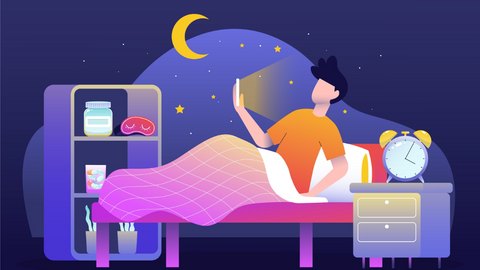We all know 8 hours of sleep each night is crucial for healthy eyes, mind and body. But let’s face it, many of us get under the recommended amount. With World Sleep Day approaching on March 19, we take a look at how blue light from your phones may be affecting your sleep and wider health.
Did you know that...

Let’s face it, we all LOVE to be on screens, even more so since lockdown measures were introduced across the globe. From video calling friends, to watching TV and even reading - it involves a screen, which = blue light.
Harmful blue light between 380-455 nm is known as high energy visible (HEV) light. This is the blue light that can cause photochemical damage, eventually leading to cell death and induce retinal damage in the eye. It can also have a pretty big effect on your sleep and we’re here to tell you why… The wavelength of light that comes from our mobile phones and other digital device screens is similar to the light that comes from the sun. Throughout time sunlight has told us when it’s time to wake and when it’s time to sleep, this is also known as the sleep and wake cycle or circadian rhythm - most commonly known as the body clock. When we use our phones late at night, it tricks our body into thinking its daytime and this can throw our body clocks out of whack. What’s more, lots of late-nights and poor sleep causes sleep deprivation and sleep disorders. This can result in you being tired, irritable, unable to concentrate and accident-prone. Sound familiar?
The wavelength of light that comes from our mobile phones and other digital device screens is similar to the light that comes from the sun. Throughout time sunlight has told us when it’s time to wake and when it’s time to sleep, this is also known as the sleep and wake cycle or circadian rhythm - most commonly known as the body clock. When we use our phones late at night, it tricks our body into thinking its daytime and this can throw our body clocks out of whack. What’s more, lots of late-nights and poor sleep causes sleep deprivation and sleep disorders. This can result in you being tired, irritable, unable to concentrate and accident-prone. Sound familiar?
 Tempting as it might be to use your computer or phone before bed, studies have shown that blue light from these devices can interfere with sleep by suppressing the production of melatonin. This is a natural hormone released in the evening to help you feel tired and ready for sleep. Screen time can also make you feel alert when you should be winding down instead, resulting in you being restless unable to nod off.
Tempting as it might be to use your computer or phone before bed, studies have shown that blue light from these devices can interfere with sleep by suppressing the production of melatonin. This is a natural hormone released in the evening to help you feel tired and ready for sleep. Screen time can also make you feel alert when you should be winding down instead, resulting in you being restless unable to nod off.
 A lack of sleep can cause us to feel tired and grouchy - and even more importantly, sleep deprivation can cause obesity, diabetes, stress, depression and heart disease. Spending as little as half an hour on your phone before bed can impact your sleeping habits. It’s never been more important to ensure a good night’s sleep to combat blue light and the side effects that come with it. Now you may be wondering how to turn off the blue light on your phone. You’re in luck! With Ocushield products you can filter out harmful blue light (without causing an orange screen that comes from software) and say goodbye to sleepless nights and all of the bad stuff that comes with it. By using a blue light filter on your phone, you can also combat headaches, tired eyes and premature ageing.
A lack of sleep can cause us to feel tired and grouchy - and even more importantly, sleep deprivation can cause obesity, diabetes, stress, depression and heart disease. Spending as little as half an hour on your phone before bed can impact your sleeping habits. It’s never been more important to ensure a good night’s sleep to combat blue light and the side effects that come with it. Now you may be wondering how to turn off the blue light on your phone. You’re in luck! With Ocushield products you can filter out harmful blue light (without causing an orange screen that comes from software) and say goodbye to sleepless nights and all of the bad stuff that comes with it. By using a blue light filter on your phone, you can also combat headaches, tired eyes and premature ageing.
How we reviewed this article:
Ocushield has strict sourcing guidelines and relies on peer-reviewed studies, academic research institutions, and medical associations.
Our experts continually monitor the health and wellness space, and we update our articles when new information becomes available.


Leave a comment